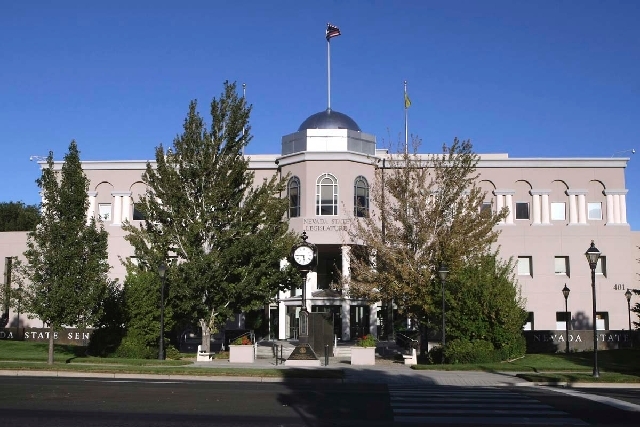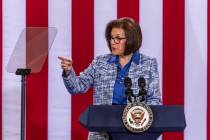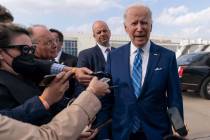Hey, D.C. and Carson City: Las Vegas needs its federal tax money back
Who keeps more of Southern Nevada’s federal tax money — Washington, D.C., or Carson City? Turns out it’s a toss-up. So how do we fix the problem? With D.C., we need to get in the game. With Carson City, we need to change the game.
Our colleagues at the Brookings Institution, Bruce Katz and Jennifer Bradley, recently published the book, “The Metropolitan Revolution: How Cities and Metros are Fixing Our Broken Politics and Fragile Economy.” Its message: Metropolitan areas are innovating business and public investment strategies that tackle tough problems and grow the economy. The book highlights stories throughout the United States, as regions stop waiting for help from Washington. The authors do not let the federal government off the hook altogether; rather, they suggest ways around political dysfunction in D.C.
Las Vegas began its own “metropolitan revolution” years before Brookings identified one. For instance, the region pioneered a way to fund roads that shared the costs of the $1.7 billion Las Vegas Beltway among local residents and businesses. It’s no shock to Southern Nevadans that the federal government has, as Katz likes to say, “Left the building.” The feds made their exit about the time Elvis did.
Our proposition is simple: Don’t expect much from the federal government, but at least get your dollars back.
If other states elect presidents and lawmakers who want big government, there is not much Nevada can do but get better at returning our taxes to the state.
How bad are we at getting dollars from D.C.? Consider that Nevada ranks 53rd (of 53 states and territories) in per-person federal “formula-based aid.”
Such aid returns money to the state — excluding defense spending and transfer payments to the elderly. Formula aid supports education, health care, housing, science and transportation. No state (and add in Guam, Puerto Rico and the Virgin Islands) receives less aid. Every dollar Nevada fails to receive goes to another state more adept at recovering these funds. Washington does not apply the unused funds to debt reduction. Other states simply gain more resources to improve quality of life and enhance economic development for their residents. Their success leaves Nevada at a competitive disadvantage in the global marketplace.
The average allocation to states in 2010 was $2,085 per head, based on county averages. Nevada received nearly $1,400 per person. Ironically, all so-called conservative “red states” performed better than Nevada. Many matched or exceeded the national average. For example Arizona got about $ 2,200; South Dakota $2,750; Montana $3,000; North Dakota $3,300 and Wyoming around $4,000. Nevada, however, prefers to leave its money for others to use. In Arizona, they talk a great libertarian, anti-D.C. game, but Nevada is the real deal.
Ranking 53rd might be desirable, or at least more tolerable, for Southern Nevadans if Carson City allocated these funds equitably. Clark County, however, lies two steps removed from a fair share of “in-state” federal resources. Nevada begins with just two-thirds of the national average in federal formula-based aid. Carson City then stiffs Clark further by cutting its share down to a measly $772 per person. How does Carson City treat Washoe County, Nevada’s other large urban county? It gets $1,664 per person.
The startling difference of $892 per person affects all aspects of life in Southern Nevada. Consider, if Clark were funded at the same level as Washoe in 2010, Southern Nevada would have added more than $1.7 billion in funding. With each passing year Southern Nevada suffers from lost opportunities to build its infrastructure, educate its children and care for the health of its residents.
Southern Nevada can change the game in Carson City by having its legislative delegation insist that all D.C.-based formulas are applied to transfer payments within the state. Given Clark’s diverse demographics and large urban scale, it is likely that the federal government has more formula dollars to invest per person in the south than the north. What has the north done with its larger share of federal aid so far? It expanded Washoe’s government service sector so much that it now exceeds gaming as an economic driver. We need to stop investing in big government in the north and start fixing problems in the south.
Finally, federal formula aid need not be a zero-sum game of north versus south if the whole state gets in the game and retrieves our fair share of dollars from D.C. If Clark demands its proper in-state money from Carson City, the north will have a powerful incentive to task the state government to better match federal programs and fill out more grant applications. Or the north could accept getting by on Clark’s level of federal aid — a prospect that should scare anyone.
Robert Lang is director of Brookings Mountain West and a professor of urban affairs at the University of Nevada, Las Vegas. William Brown is the assistant director of Brookings Mountain West.
Related Story
Everybody wants a piece of federal pie




























